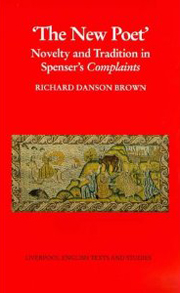
-
The digital format of this book is no longer available to purchase from Cambridge Core. Other formats may be available.
-
Select format
-
- Publisher:
- Liverpool University Press
- Publication date:
- 05 November 2011
- 01 April 1999
- ISBN:
- 9781846313660
- 9780853238034
- Dimensions:
- Weight & Pages:
- 00kg,
- Dimensions:
- Weight & Pages:
You may already have access via personal or institutional login
Book description
This gracefully written and well thought-out study deals with a neglected collection of poems by Spenser, which was issued in 1591 at the height of his career. While there has been a good deal written in recent years on two of the poems in the collection, Mother Hubberds Tale and Muiopotmos, Brown innovatively addresses the collection in its entirety. He urges us to see it as a planned whole with a consistent design on the reader: he fully acknowledges, and even brings out further, the heterogeneity of the collection, but he examines it nevertheless as a sustained reflection on the nature of poetry and the auspices for writing in a modern world, distancing itself from the traditions of the immediate past. The strength of this work lies both in the originality of its project and in the precision and enterprise of the close reading that informs its argument. Interest in the concern of Spensers poetry with the nature of poetry is in the current critical mainstream, but here the attentiveness is both unusually focused and unusually sustained. Brown garners more than would be expected from the translations in the Complaints, while at the same time including striking and individual chapters on the better known Mother Hubberds Tale and Muiopotmos; he advances understanding of these extremely subtle texts and fully justifies his wider approach to the collection as a whole. Arguing that Spensers relationship to literary tradition is more complex than is often thought, Brown suggests that Spenser was a self-conscious innovator whose gradual move away from traditional poetics is exhibited by the different texts in the Complaints. He further suggests that the Complaints are a poetics in practice, which progress from traditional ideas of poetry to a new poetry that emerges through Spensers transformation of traditional complaint.
Contents
Metrics
Full text views
Full text views help Loading metrics...
Loading metrics...
* Views captured on Cambridge Core between #date#. This data will be updated every 24 hours.
Usage data cannot currently be displayed.
Accessibility standard: Unknown
Why this information is here
This section outlines the accessibility features of this content - including support for screen readers, full keyboard navigation and high-contrast display options. This may not be relevant for you.
Accessibility Information
Accessibility compliance for the PDF of this book is currently unknown and may be updated in the future.


